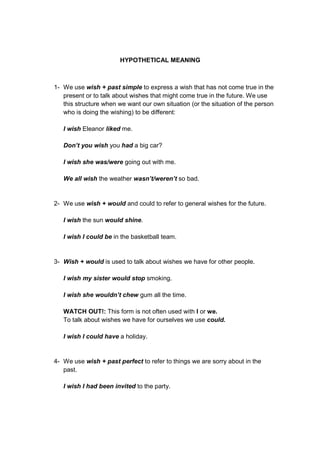
Hypothetical meaning
- 1. HYPOTHETICAL MEANING 1- We use wish + past simple to express a wish that has not come true in the present or to talk about wishes that might come true in the future. We use this structure when we want our own situation (or the situation of the person who is doing the wishing) to be different: I wish Eleanor liked me. Don’t you wish you had a big car? I wish she was/were going out with me. We all wish the weather wasn’t/weren’t so bad. 2- We use wish + would and could to refer to general wishes for the future. I wish the sun would shine. I wish I could be in the basketball team. 3- Wish + would is used to talk about wishes we have for other people. I wish my sister would stop smoking. I wish she wouldn’t chew gum all the time. WATCH OUT!: This form is not often used with I or we. To talk about wishes we have for ourselves we use could. I wish I could have a holiday. 4- We use wish + past perfect to refer to things we are sorry about in the past. I wish I had been invited to the party.
- 2. She wishes she hadn’t told him about Carlo. • IF ONLY If only is used with the same verb forms as wish, and is used when your feelings are stronger. It is often used with an exclamation mark (!). It is often used with would/wouldn’t to criticize someone else’s behavior. If only I could find the answer! If only they would stop talking! If only I had never met him! • IT’S TIME It’s time is used with the past simple to talk about the present or the future. We mean that the action should have been done before. For emphasis, we can also say It’s about time and It’s high time. It’s (about) time you started revising for the exam. It’s (high)time we set off. The train leaves in half an hour. • WOULD RATHER 1- We use would rather + past simple to say what we want someone or something else to do in the present or future. I’d rather you didn’t tell anyone about this. Would you rather I asked someone else? I’d rather we didn’t discuss that, if you don’t mind.
- 3. 2- We use would rather + past perfect to say what we wanted to happen in the past. I’d rather you hadn’t told her that. I’d rather you had asked me first. Note: would rather + infinitive without to is used to talk about our or other people’s preferences in the present or future. I’d rather go to the concert than to the opera. They’d rather go on foot. • SUPPOSE/WHAT IF Suppose means What if…? It is used with: 1- The present simple to describe something that may possibly happen or may have happened. Suppose someone sees her with us. Suppose someone hears you coming in. 2- The past simple to talk about something that is just imagination or which is unlikely to happen in the future. Suppose Eleanor knew you loved her. What would you do? Suppose you won the prize. How would you feel? 3- The past perfect to talk about something that could have happened in the past but didn’t. Suppose we hadn’t told her. Do you think she would have found out? Suppose you had married Carlos. Would you have been happy together?
